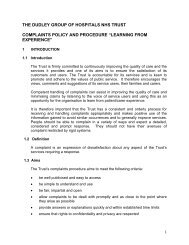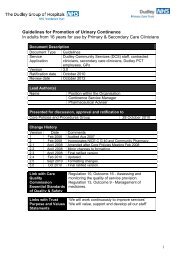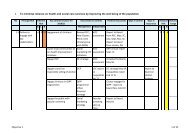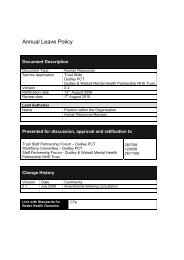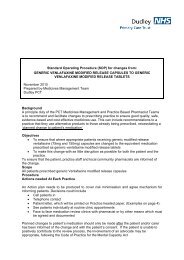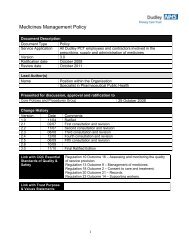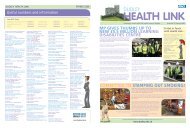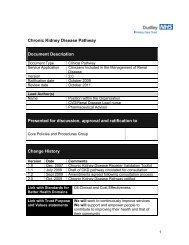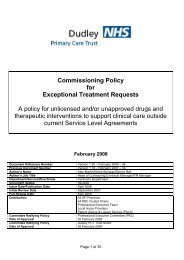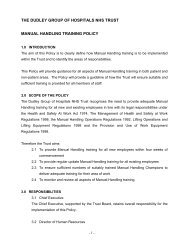Dudley Strategy for Tackling Health Inequalities 2010-15
Dudley Strategy for Tackling Health Inequalities 2010-15
Dudley Strategy for Tackling Health Inequalities 2010-15
- No tags were found...
You also want an ePaper? Increase the reach of your titles
YUMPU automatically turns print PDFs into web optimized ePapers that Google loves.
and less radical treatment than younger people. It is true that some older people willpresent later, have co-morbidities or are too frail <strong>for</strong> treatment but age should neverbe the sole reason <strong>for</strong> treatment decisions. NCIN estimated that around <strong>15</strong>,000people aged 75 and over die prematurely from cancer in the UK each year.Men are diagnosed with more cancers (excess incidence 16%) and have a highermortality from cancer (38% excess mortality) although this varies by cancer type.This means that there are more women than men living with or beyond a diagnosisof cancer. Cancer accounts <strong>for</strong> 25% of the life expectancy gap <strong>for</strong> men and 16% ofthe gap <strong>for</strong> women. The cancers which would deliver the greatest increase in lifeexpectancy in <strong>Dudley</strong> if mortality rates were equivalent to the UK average are:oesophago-gastric cancers, colorectal cancer, lung cancer and breast cancer.Men have a lower awareness of the signs and symptoms of cancer but although ithas been assumed that men delay seeking help there is no evidence that this is thecase. Some men find GP services to be inaccessible and further work is needed todevelop “male friendly” primary care services.People with mental health problems have higher smoking rates and higher rates ofoverweight and obesity. People with schizophrenia have been found to be twice aslikely to have bowel cancer and sufferers with depression have higher rates of breastcancer. Evidence suggests people with mental health problems are more likely topostpone presentation when they have cancer symptoms, delay the diagnosisprocess and present with more advanced cancer. They also have poorer uptake ofscreening programmes. Mental health professionals may have little training in cancersigns and symptoms while primary care staff may not always have thecommunication skills required to assess the needs of individuals with mental healthproblems.Similarly people with learning difficulties may struggle to express changes to theirhealth potentially complicating and delaying diagnosis and also have lower uptake ofscreening programmes.Variations in cancer incidence between ethnic groups, is likely to be the result of amixture of lifestyle and genetic factors. As well as cultural factors variation may alsobe related to deprivation. Women from minority ethnic groups are more likely topresent with more advanced breast cancers and have poorer survival than whitewomen. Breast cancer occurs at a younger age and as a more aggressive tumourtype among black women of African or Caribbean descent. However breast cancerrates are lower among South Asian women. Smoking rates and tobaccoconsumption are higher among males from some minority ethnic communitiesincluding Bangladeshi, Caribbean and Chinese. Prostate cancer rates are higheramong black African and Caribbean men.Cancer awareness is generally lower in minority ethnic groups as is screeninguptake. These vulnerable groups have unmet needs relating to health in<strong>for</strong>mation,awareness of cancer risk factors, signs and symptoms and cancer services. There isa need <strong>for</strong> access to culturally relevant in<strong>for</strong>mation about cancer and its signs andsymptoms.131



